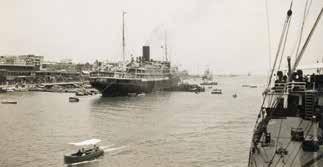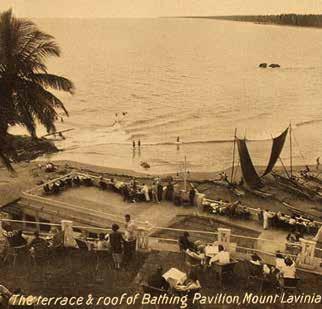
7 minute read
Stories from the Archives Very much love from Lenis
38 STORIES FROM THE ARCHIVES
VERY MUCH LOVE FROM LENIS
My Dearest Everyone, When the Cabin Steward called us at 4 am, “You will be in port in about twenty minutes”, our ablutions were hastier than usual and within the twenty minutes we were on deck, watching the lights of Port Said and all the activities which attend the arrival of a vessel in the harbour. . . Very much love from Lenis
She was an inveterate letter writer. Letters to her family invariably began with “My Dearest Everyone” and closed with “Very much love from Lenis”, presumably her pet name. She was the only female Principal to serve our College during wartime. She was the only Principal who was not born in Australia. She was the only Principal to head two Presbyterian colleges, in succession, and both in New South Wales. Indeed, she was the only Principal to have three headships to her credit in her career. But near the end of 1937 Dr Helen Isabella Wilkie, aged 42, was a passenger aboard the Twin Screw Steamship T.S.S. Jervis Bay at the entrance to the Red Sea, 14.XI.37. Built in 1922 for the Aberdeen and Commonwealth Government Line, the Jervis Bay travelled the UK to Australia shipping route to encourage assisted migration and to increase capacity for the export of Australian produce. Dr Wilkie, travelling on her own, had left her native Edinburgh and was heading to Sydney, and thence to Armidale, where she was to become the Principal of PLC Armidale. While we do not know what led her to decide to move to the other side of the world to head a struggling school in a country town, we do know that she relished the voyage, for our College Archives holds a ten-page typewritten document that combines seven letters written between Port Said and Sydney that recounts the journey. Dr Wilkie was a keen observer of the people and places she experienced, here are some extracts: Now you must realise that all the fishermen, in fact almost everyone whom we had met. . . wore real Eastern clothes and the majority were barefoot. They seemed to have great dignity of carriage. . . What a motley assortment of colours and shapes of garments – flowing robes which came down from shoulder to ankle worn with a turban; nondescript robes worn with a red fez; and one which could easily have claimed kinship with a gym tunic.
Port Said, Egypt
By this time the clouds were piling up and it looked as if we were in for a bad thunder storm, but with our usual luck we did not get more than occasional very heavy showers; but it did keep hot and clammy. We gradually settled down to our longest stretch of ocean. The weather appeared to become hotter as we crossed the equator. We did that at 3 am, so there were no ceremonies accompanying the “crossing of the line”.
Between Colombo and the Australian Bight
We have reached Australia at last. There in the distance was the low coastline of the district around Fremantle. . . the queue then moved on to the smoke room, where the customs and other officials were sitting. There they stamped passports and took from us our landing cards. Now I am all ready officially to land on Australian soil. . .the cabin steward came to find me because there was someone to see me in the lounge. . . I went to find that the President of the West Australia Association of University Women was there to greet me, bringing with her her small daughter and a lovely bouquet. . . as a greeting from the Association. We spoke for some time. Then a Press Representative came up and interviewed me. I felt terribly important.
Fremantle, Western Australia
Dr Helen Isabella Wilkie was 46 years old when she became the fourth Principal of PLC Sydney. It was January 1942 and Australia had been at war since September 1939. Less than a month after her 47th birthday on 18 April, the Croydon campus had been requisitioned by the RAAF to be used as a radar unit, the College had been packed up, and both goods and students had relocated to temporary premises in Strathfield.
Even with the kind help from Meriden School with sharing some classroom and boarding space with us, Dr Wilkie’s time as Principal was dominated by the challenges imposed by adapting to temporary facilities and the hardships of war and rationing. Still, the curriculum remained robust.


2 3 4


5 6

1. A view of Port Said as it looked when Dr Wilkie visited en route to Australia in 1937 2. The Jervis Bay offered a one class service between England and Australia via the Suez Canal 3. The Mount Lavinia Hotel near Colombo in the 1930s 4. A view of the premises at 18 Margaret Street, Strathfield during World War II 5. A view of Port Said as it looked when Dr Wilkie visited en route to Australia in 1937 6. Rediscovering Sri Lanka through a travel memoir-Tripsy
As well as English, Ancient and Modern History, Geography, French, Latin, Mathematics, Botany, Chemistry, Physiology and Biology, class singing, musical appreciation, physical education and sports, drawing, elocution, dancing, shorthand, typing, bookkeeping and business principles were also offered. In 1945 changes were made to promote a wider study of Science and a wool-classing class was introduced. And, perhaps surprisingly, the enrolment increased: from 165 in February 1942 to 288 in December 1945. The Archives holds a number of both typewritten and handwritten letters (copies, perhaps) that Dr Wilkie wrote to her family in Scotland while the College was at Strathfield. In the main they relate school matters: Jersey Day, packing to move to Strathfield, an outbreak of measles amongst the boarders, interviewing staff, meetings with students and parents, meetings of local wardens and testing respirators, writing Speech Day reports. Occasionally she mentions going to a film, a symphony concert, or a short trip to Canberra during school holidays. Of special interest is her letter describing VE Day -- Victory in Europe, 8 May 1945 – an event that, owing to the time difference with Europe, was primarily celebrated on the Wednesday, 9 May, in Australia.
. . . Mr Chifley [the Prime Minister] was to speak to Australia at 9.30 am, so I had just time to collect the staff who had a “free” period and get the K.G. . . We heard the glad news, went back to the Senior School building and made the announcement piece meal. Sirens could be heard by now but their effect was very feeble and there were no church bells alas! The pupils left their classrooms knowing that in a very short time a bell would ring to summon them to a dismissal assembly.
And on the following day, Thursday 9 May 1945:
They [the boarders] decorated their rooms with streamers, tore papers into butterfly bows for their hair and generally went gay. One manifestation of joy for which I can give no explanation was the stripping of all beds and the placing of the blankets and pillows on the floor. The sleeping quarters looked dreadful but the girls had let off steam so we said nothing and I put up with a great deal of extra noise. In the evening we went to a joint service in the Methodist church and then had coffee and cake as a special treat.
World War II officially ended on 2 September 1945, after VJ Day (Victory in Japan) was declared on 15 August. By the end of the year Dr Wilkie, whose mother had died earlier in the year, had resigned in order to return to Scotland to attend to family matters. Subsequently, she became the Principal of Rothesay House School in Edinburgh. She never returned to Australia, but she did correspond with her successors Miss Whitlam and Miss Dyson. Wilkie House, established in 1995, recognises our fourth Principal.
Ms Debby Cramer
Archivist










